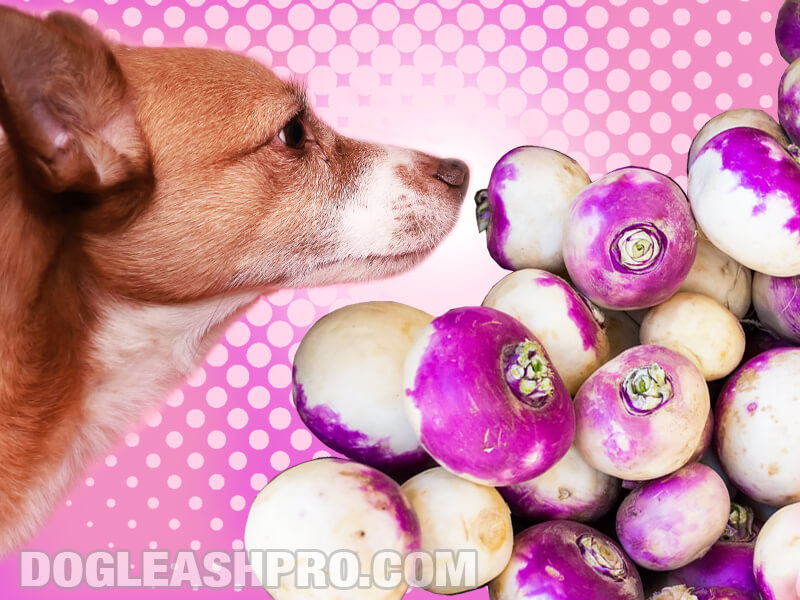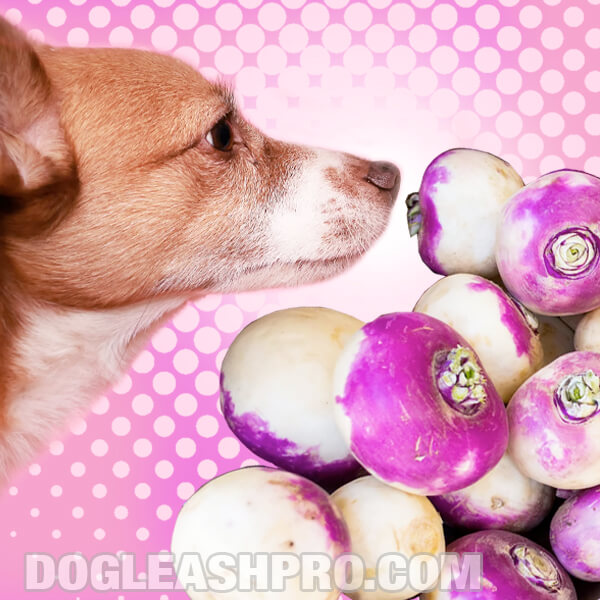
Turnips are a great recipe in many main and side dishes. They are also delicious and nutritious. As you’re preparing your Turnip dish, your dogs may come over and beg you for some Turnips. But are Turnips safe for doggy consumption? If you’re wondering, “Can dog eat Turnip?” here is the quick answer first.
Can dogs eat Turnips? Yes, dogs can eat Turnips in moderation. Turnip is a low-calorie food that is packed full of vitamins and minerals which are beneficial to our dog’s health. Consuming a moderate amount of Turnip will support and improve your dog’s nervous system, metabolism, and even kidney functions for dogs with kidney disease. However, dogs with thyroid problems should avoid Turnips at cost.
Read on to find out which essential vitamins and minerals this root vegetable contains and how these nutrients help benefit your canine friend’s health. We’ll also discuss how Turnips can be bad for your pooch.
Table of Contents
Can dogs have Turnips?

Yes, dogs can have Turnips in moderation. To fully understand why our four-legged friends can have Turnips, let’s briefly discuss what Turnips are and how they are good for our precious canine family members.
What are Turnips?
Turnips are also known as white Turnips. They are a biennial plant and belong to the Brassica family of vegetables. They are root vegetables just like parsnips, carrots, potatoes, beetroots, daikon radish, and yucca.
The closest relatives to Turnips are arugula and radishes.
There are 4 main parts to the Turnip. They are:
1. Turnip Greens
The leafy greens of the Turnips are also known as Turnip Greens. In the UK, people refer to the Turnip Greens as Turnip tops. However way you want to call them, the Turnip Greens looks very much like Mustard greens.
2. Root of the Turnip
The root of this vegetable is the round, globular, and bulbous shape of the Turnip. Scientifically, it’s called the hypocotyl. The diameter of the Turnip root can be as short as 2 inches (5 cm) and as long as 8 inches (20 cm). You most likely won’t find any side root growing out of the Turnip root.
The skin of the Turnip root is normally white. However, you may say that you’ve seen red or purple Turnips and not all white Turnips. This is also true. Here’s why.
Sometimes you’ll see about 1 to 2 inches of the Turnip root (or Turnip as we know it) growing and coming up from the soil. When this exposed root receives sunlight, it will turn red, purple, or even green.
This is why you’ll see Turnips being red or purple near the leafy greens and white on the bottom where the taproot is.
The root of the Turnip is also known as the storage root where it contains the flesh.
3. Interior flesh of the Turnip.
Turnips have a white bulbous interior flesh.
4. Taproot of the Turnip
The taproot of the Turnip is also known as the normal root and it is pretty thin and long. The root can be as long as 4 inches (10 cm) in length. You may also find secondary and tertiary roots at the taproot of the Turnip.
Most farmers trim or cut off the taproot before selling the Turnip.
Now that we’re clear on what Turnips are and the different parts of this root vegetable, let’s dive right into how Turnips are good for our furry friends.
Are Turnips good for dogs?
Yes, Turnips are good for dogs when consumed in moderation. Turnips provide a ton of nutrients for our furry family members.
These nutrients include essential vitamins and minerals our canine friends need in order to function properly, maintain a healthy life, and be happy.
These nutrients include:
- Vitamins A, B1, B2, B3, B5, B6, C, E, and K.
- Fiber.
- Folate.
- Calcium.
- Copper.
- Iron.
- Magnesium.
- Manganese.
- Folic acid.
- Potassium.
- Protein.
- Omega-3 fatty acids.
- Phosphorus.
Let’s go over how each of these benefits your furry pals’ health.
Turnips contain essential vitamins to keep your dogs in good health
Vitamin A
Turnips contain a fat-soluble vitamin called Vitamin A. Vitamin A is crucial for good vision in dogs. Additionally, vitamin A helps improve your dog’s cell function, immune system, and is critical during fetal development.
B Vitamins: B1, B2, B3, B5, B6
Vitamin B1 is also known as thiamine which is another essential vitamin that your four-legged friends need. Your pooch needs B1 to function properly since thiamine helps to supply energy to your dog’s brain cells organ cells. Thiamine also stimulates ion channels in your dog’s neural tissue.
Vitamin B2 is also known as riboflavin and it is very similar to vitamin B1. Your dogs need riboflavin because it assists in the metabolism of carbohydrates and amino acids in your dog’s body.
Vitamin B3 or niacin is crucial because it is responsible for reducing skin inflammation in dogs.
Vitamin B5 or pantothenic acid is an essential nutrient that your dogs need because it is responsible for energy metabolism.
Vitamin B6 or pyridoxine is a water-soluble vitamin that is responsible for the following in dogs:
- Immune response.
- Nervous system function.
- Red blood cell function.
- Hormone regulation.
- Glucose generation.
- Gene activation.
- Niacin synthesis.
As we can see, the B vitamins found in Turnips will help maintain a healthy immune system and nervous system in dogs. Your pooch will have a lot of energy to play and learn new tricks because the B vitamins help your dog’s body break down amino acids and carbohydrates into energy. Your precious pup will have healthy blood cells and best of all, they will thank you for their healthy skin and coat.
Vitamin C
All dogs need vitamin C. The vitamin C found in Turnips is an antioxidant that helps to slow down cognitive aging and reduce inflammation by fighting against harmful free radicals in your dog’s body.
Fortunately, your dog’s liver actually makes its own supply of vitamin C. However, it doesn’t hurt to offer him or her an extra boost of vitamin C every now and then.
Vitamin E
The vitamin E found in Turnip is a fat-soluble vitamin that is responsible for fat metabolism and cell function. Without sufficient vitamin E, your pooch may experience reproductive issues as well as muscle and eye degeneration.
So make sure your K9 pals are getting their daily dose of vitamin E so that they are protected against harmful free radicals which can cause cancer and damage good cells in your dog’s body.
Overall, with sufficient vitamin E, your pooch will have healthy and strong muscles as well as proper circulation.
Vitamin K
Like vitamin E, vitamin K is also a fat-soluble vitamin. Our K9 friends need Vitamin K so that their blood can clot which allows them to heal properly from wounds such as cuts.
Dogs with vitamin K deficiency are at risk since their blood may not be able to clot and as a result, they will bleed out.
Vitamin K is also responsible for good bone and heart health. For these reasons, it’s a great idea to offer your pooch a moderate amount of Turnip.
On a separate note, be sure to keep mouse or rat poisons away from your dogs. If your dogs accidentally get into them and ingest them, the chemical in the poison may react by suppressing your dog’s ability to use this essential vitamin in their bodies.
This can result in hemorrhage if this is not treated immediately.
Fun Fact: Mulberries also contain vitamins B6 and vitamins C. But are they safe for doggy consumption? Check out Can Dogs Eat Mulberries? to find out!
Turnips contain key minerals for healthy bones, muscles, bodies, and brains in dogs
Now, let’s go over the key minerals in Turnips.
Turnips are high in fiber which promotes a healthy digestive system in dogs
Turnip is packed full of fiber which allows proper digestive system function in dogs. If your pooch is suffering from diarrhea or constipation, feel free to feed him a small amount of Turnip.
With sufficient fiber intake, your dog will have healthy bowel movements, balanced blood sugar levels, low cholesterol levels, and healthy metabolism.
Folate in Turnips stimulates red blood cell production and healthy cell growth in dogs
Another reason why it’s a good idea to feed your pooch a moderate amount of Turnip is that the folate or folic acid found in this root vegetable is crucial for red blood cell production and healthy cell growth.
If your female dog is pregnant or in the early stages of pregnancy, adding some Turnip to her meal can help to reduce the risk of spine and brain deformity.
Calcium found in Turnips contributes to strong and healthy teeth, bones, and muscle in dogs
You’ve probably heard that calcium is essential for building strong teeth and bones in dogs and this is very true! To add to that, calcium also provides your dogs with the following:
- Strong muscles.
- Proper muscle function.
- Healthy heart.
- Proper nervous system function.
As we can see, Turnips are a great addition to your dog’s diet.
Are Turnips Bad For Dogs?
Yes, Turnips can be bad for dogs if your dog eats too many Turnips. As we can see above, Turnips are high in fiber, and eating too much of anything (even though it’s good) can have negative effects as well.
For instance, eating too many Turnips can actually give your furry family member digestive problems like upset stomach or diarrhea. So moderation is key when feeding your pooch Turnips.
Also, if your dogs have thyroid issues, do not feed them Turnips. Turnips can actually suppress your dog’s thyroid function.
Turnips and dogs
Can dogs eat Turnip Greens?
Yes, dogs can eat Turnip Greens in moderation. The Turnip Greens also contain important vitamins and minerals that are beneficial to your canine friend’s health. Here is the nutritional profile of a 55-gram cup of raw Turnip Greens.
Raw Turnip Greens Nutritional Facts (55-gram cup)
| Name, Unit | Amount |
| Calories, cal | 18 |
| Sugar, g | 0.45 |
| Sodium, mg | 22 |
| Carbohydrate, g | 3.92 |
| Total Fat, g | 0.17 |
| Protein, g | 0.82 |
| Fiber, g | 1.8 |
| Calcium, mg | 104 |
| Iron, mg | 0.61 |
| Magnesium, mg | 17 |
| Phosphorus, mg | 23 |
| Potassium, mg | 163 |
| Zinc, mg | 0.1 |
| Vitamin C, mg | 33 |
| Folate, µg | 105 |
| Vitamin A, µg | 318 |
| Vitamin K, µg | 138 |
Make sure to only feed your pooch a small amount of Turnip Greens because they do have a high level of sodium. Avoid adding additional salt to these leafy greens when you’re feeding them to your pooch.
Before you feed these leafy greens to your pooch, make sure to properly prepare them first.
Can dogs eat cooked Turnip Greens? Yes, dogs can eat cooked Turnip Greens in moderation.
In fact, cooked Turnip Greens are best for doggy consumption. You’ll want to wash and rinse the Turnip Greens first to get rid of any dirt or soil. Then, you can steam the leafy greens and chop them up into smaller pieces so it’s easier for your dogs to consume and digest them.
You might also like: Can Dogs Eat Horseradish?
Can dogs eat raw Turnips?

Yes, dogs can eat raw Turnips in moderation. You’ll also want to chop the raw Turnip into smaller pieces so that they are easy for your dogs to chew. Chopping it into smaller pieces also avoids any choking hazard or intestinal obstruction in dogs.
The best way to feed your dog raw Turnips is by adding a small amount of it into his or her regular food.
A moderate amount of Turnips can stimulate and regular your canine friend’s metabolism. If your pooch is on weight management or on a weight loss program, adding a small amount of raw Turnips may help.
If this is the first time your dog is having raw Turnips, make sure to introduce this vegetable slowly and gradually. After their first bite or two, check to make sure they don’t have any negative reactions from it.
If you have questions about your dog’s nutritional needs or are ever concerned, we highly recommend that you consult with your dog’s vet.
So, can dogs eat Turnips?
As with other human food that is safe for canine consumption, it’s best to feed your dogs Turnips in moderation. Allowing your precious pups to eat too many Turnips can actually cause negative health effects in dogs.
When consumed in moderation, Turnips can provide your dog with a wealth of health benefits, including healthy metabolism function, proper nervous system function, and can even benefit your dogs with kidney disease since this root vegetable can stimulate your dog’s kidney function.
If you’re ever concerned with how your pooch may react after eating Turnips, it’s best to speak with your dog’s vet. He or she knows your dog best and will know how your dog may react after consuming this root vegetable.
DISCLAIMER: THIS WEBSITE DOES NOT PROVIDE MEDICAL ADVICE
The information, including but not limited to, text, graphics, images and other material contained on this website are for informational purposes only. No material on this site is intended to be a substitute for professional veterinary advice, diagnosis, or treatment. Always seek the advice of your veterinarian or other qualified health care provider with any questions you may have regarding dietary needs.
Resources:
https://en.wikipedia.org/wiki/Turnip
https://www.britannica.com/science/taproot

With over five years of specialized experience as an animal writer, my expertise lies in dog nutrition, health, behavior, grooming, and training. I am dedicated to delivering helpful and informative content that caters to the well-being of our furry friends. My primary goal is to empower pet owners with knowledge and ensure our canine companions thrive in health and happiness. In my free time, I love volunteering at local dog rescue centers.







